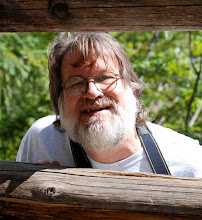The Semantics of Reporting Executions
Partially I have been looking at stories of executions because they are there. In our numbers-loving, milestone-loving country, we are approaching the 1000th Execution since the death poenalty was re-instituted in the US.
Partially I have been reading accounts of executions and Death Row activities because one of the characters in one of the novels I am working on is a convicted murderer.
Something I would like to see attention drawn to is how the news media with its semantics builds realities that may not be true. In the story of Kenneth Lee Boyd (see previous link), the lead paragraph says: "A man who killed his wife and father-in-law pinned his hopes on last-minute intervention from the governor or the courts as he awaited lethal injection early Friday in the nation's 1,000th execution since capital punishment resumed in 1977."
Pinned his hopes?
How does anybody know that? Makes it sound like he's desperate. How do we or the reporters know that he'd just as soon get it over with and die?
This to me is how the news dramatizes things. We have this assumption that people on Death Row are terrified of dying. I guess we need to have that to help justify why we are killing them. If we keep calling it the "ultimate penalty" (similar to "the ultimate sacrifice" in warfare) then we can keep the whole processs going. We give the illusion of diabolical punishment to the crooks who did the bad deeds way back when.
Prison doesn't look like much fun to me. I could really be missing something here, but if I had to face the rest of my life in Shawshank or get a nice ride out on lethal injection, I suspect I'd choose the latter.
We seem to think that all convicted murderers want to live. But there are different ways of looking at things, as is true for any terrorist who blows him or herself up in a holy war. They're thinking eternal reward somewhere else. My point is not that convicted murderers think they're going to be rewarded anywhere, but they most likely don't share the same outlook on life as do the people who want to see the murderer gonzo.
They may see execution as government-assisted suicide.
Or then there's this story about the once-"normal" Belgian girl who grew up to be a suicide bomber in Iraq. Not everybody plays by the same paradigm.
I am not saying that convicted murderes truly want to die; I am mostly just commenting on how news reporters characterize these people. I suspect thaqt those who did commit the crimes may be quite afraid of what happens after death. If they are worried about punishment above (or below) and beyond the court system, they might want to put off their reckoning as long as possible.


0 Comments:
Post a Comment
<< Home